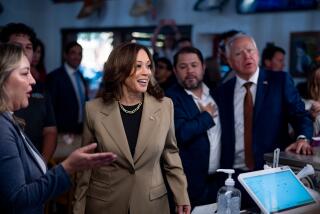A First Primary Where People Meet Presidents
HANCOCK, N.H. — The story goes that a farmer driving a load of hay stopped at the entrance to a long covered bridge and studied it. “I can get through this end all right,” he said before turning back, “but I sure can’t squeeze through that one down there.”
Perspective, as they say, is all, and the New Hampshire presidential primary focuses the national eye as no other primary can. Candidates know that by next February only a few are going to squeeze through and head on down the big-time interstate to the White House.
How does a state .3% the size of the nation with .4% of the population do it? Because it has always done it, since 1952. So jealously guarded is this first-in-the-nation primary that the state has actually legislated its primary to be the first.
New Hampshire has 54 covered bridges, 900 lakes, 37% registered Republicans, 31% Democrats, 32% unaffiliated, and the priority is pretty much in order here. First-primary running is a mixture of down-home clam chowder get-togethers and sparkle-and-spangle male versions of “The Rockettes on the Road.”
What makes the New Hampshire primary so singular, however, is not merely being early but attaching its long-eyed assessments of the candidates.
New Hampshire’s contribution is a reminder to candidates that they’re meeting real people in hundreds of living room coffees, that the people answer back in these uncontrolled situations--and candidates have to deal with them or goodby.
The citizens take their role seriously. On the whole, they don’t put up with much baloney. They aren’t easily impressed and they don’t like to be pushed around. Not without metaphorical significance did Gary Hart’s cosmic campaign end in small-town Littleton, N.H.
Critics who quadrennially moan and groan about the influence of New Hampshire on the race point out that the state is not typical of the country, as if California or Nebraska were. Of course, New Hampshire isn’t typical. This year, statewide unemployment has hovered at 2.7%, now considered no unemployment but merely figures to represent people between jobs. Its high-tech industry continues to thrive and siphon off personnel and businesses from neighboring “Taxachusettes,” as the locals like to say. New Hampshire ranks 49th in state and local tax revenues, 43rd in federal expenditures. Rock-bottom taxes can mean meager services; New Hampshire is no place to be handicapped or mentally ill, an artist or serious library researcher. On the other hand, despite low teacher salaries, New Hampshire placed first in the nation in the Scholastic Aptitude Tests (SAT) scores last year--and every year for the last five.
What the people of New Hampshire do represent are the hopes, desires, fears, concerns and ideals of the country as a whole. In this sense, yes, they are a sample of the national soup.
They aren’t the only ones who can test it, but their primary is the starting point and increasingly fewer states are positioned for personal contact beyond a handshake and a shoeshine. Here, the candidate is the campaign. Here, people demand interaction with candidates; a distant wave and a TV blip do not suffice.
Hopeful Bruce Babbitt, former governor of Arizona, attended a typical “coffee” recently in Keene, a 21,000-people town in the wooded southwestern corner of the state. Forty people showed up. One commented to all, “He’s late.” Fifteen minutes.
When Babbitt arrived at the small house in a neighborhood of hard-working citizens, he made the slow round of shaking hands and chatting. The dining room table offered grapes, Brie cheese, Vermont Cheddar, sliced apples, crackers; wine, beer and soda were in the kitchen. The candidate, blue-suited, took to a side wall, and in this homey, literate, scrutinizing crowd he spoke for 10 minutes. Then, as is the custom, he opened the rest of the hour to questions--and, politely, got good and grilled.
One woman kept at him about nuclear power. She challenged his position of managing existing plants and developing no more. “It’s either a poisonous technology or it isn’t,” she said flatly, wanting them all stopped. Babbitt asked, to laughs, “Can I win you over on arms control?”
A man asked about the homeless in an extraordinarily rich country, the estimated 26 million functional illiterates in the United States and whether the candidate would be working toward world government. The man didn’t get enough answers. The candidate was against homelessness and illiteracy. World government had to wait until other problems were solved. Next question. But the man persisted: “The question about world government isn’t irrelevant. . . . We want to know what your policies will be when you’re in the White House.”
On it went: long discussions of photovoltaic energy, budgeting and taxation, long assessments of what kind of man this candidate is as a guest in a local’s home.
He was adept, convincing to some, well-examined by all. Afterward, a stalwart older woman said, “Well, he has moxie.” The would-be President later invited her to a party in the White House. “I’ll be in shock if you remember,” she said, having heard baloney in the past.
The candidate ambled into the kitchen to talk with the hosts and then drove off with his coordinators for his third coffee of the day. This one would be in Harrisville, a Lilliputian brick town of 1,100 population. It was 7:30 p.m.
Each candidate spends about 30 days in New Hampshire over the campaign and attends, on average, 65 coffees.
These coffees average 25 people. Is all this worth it to the candidates? The people don’t care about that. It’s worth it to them. Their attitude is that, given the chance, they would change Mr. President to Mr. Civil Servant. That’s worth the New Hampshire primary right there.
More to Read
Get the L.A. Times Politics newsletter
Deeply reported insights into legislation, politics and policy from Sacramento, Washington and beyond. In your inbox three times per week.
You may occasionally receive promotional content from the Los Angeles Times.










